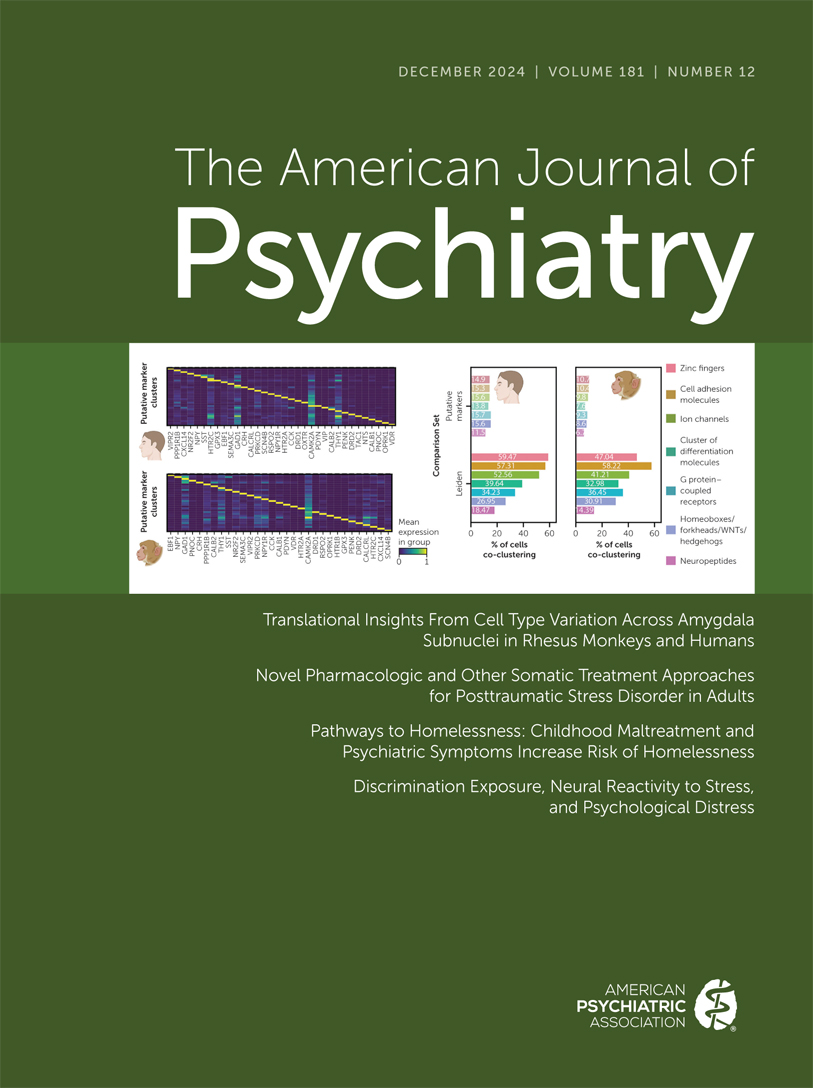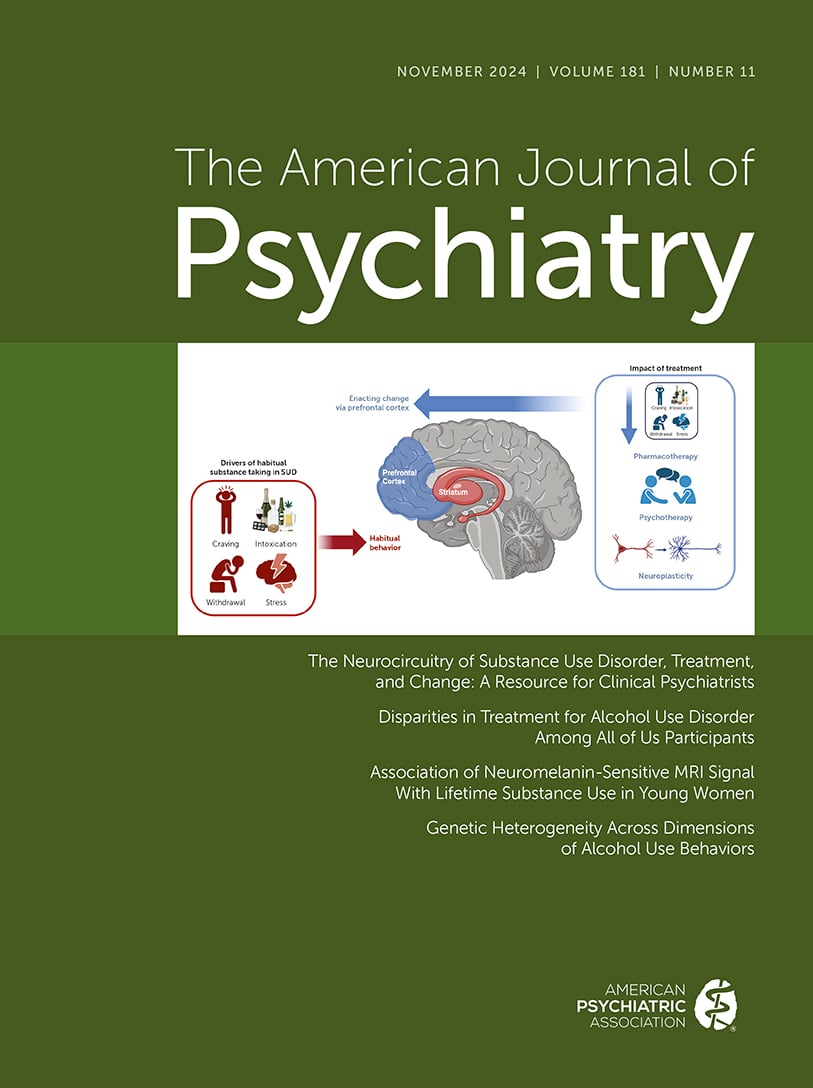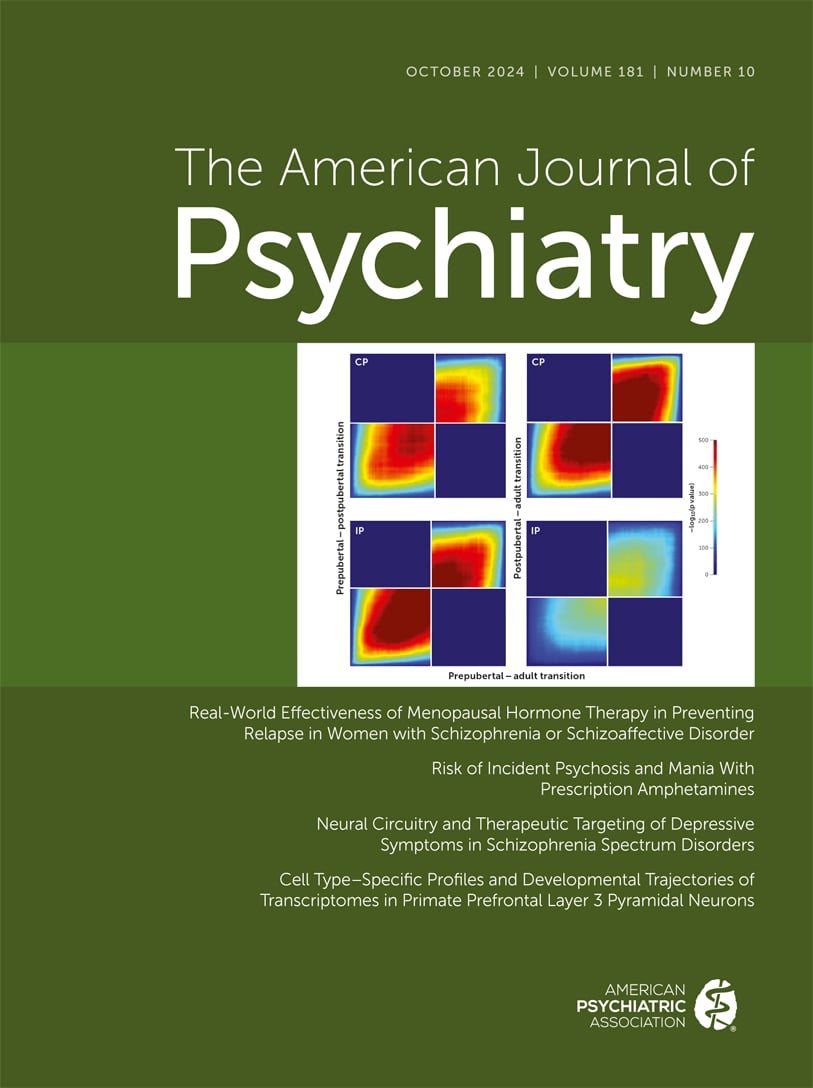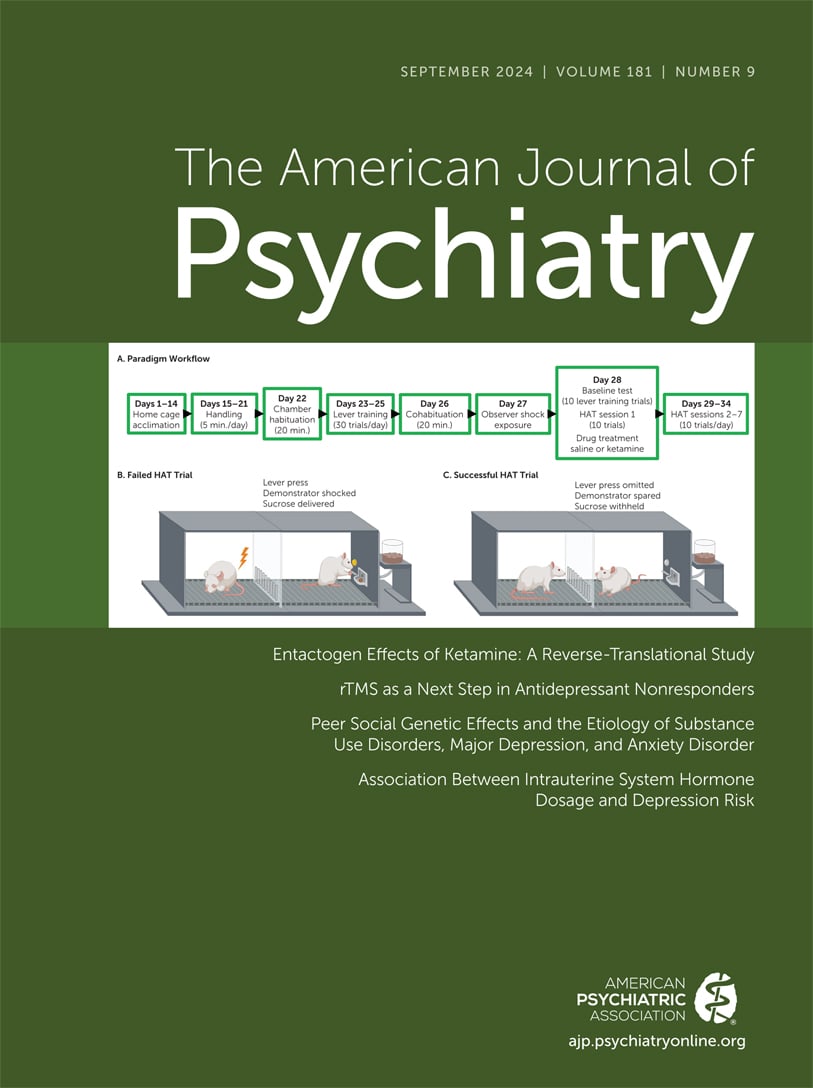American Journal of Psychiatry
- Volume 141
- Number 1
- January 1984
Publication date: 01 January 1984
Pages1–9The New York Longitudinal Study has followed the behavioral development of 133 subjects from early infancy to early adult life. Special attention has been given to the systematic clinical evaluation and follow-up of all subjects presenting any evidence of ...
https://doi.org/10.1176/ajp.141.1.1Publication date: 01 January 1984
Pages10–15The "first generation" of research studies on the prediction of violent behavior found such prediction to be highly inaccurate. Many social policy changes were implemented or recommended on the basis of that research. More recently, a second generation of ...
https://doi.org/10.1176/ajp.141.1.10Publication date: 01 January 1984
Pages16–19The subjective response to antipsychotic medication was systematically evaluated in two samples of schizophrenic patients, one treated with haloperidol, the other with thiothixene. For both groups, a dysphoric response to the first dose was found to be a ...
https://doi.org/10.1176/ajp.141.1.16Publication date: 01 January 1984
Pages20–23Of 41 children, adolescents, and young adults who were withdrawn from chronic neuroleptic treatment, 18 developed tardive dyskinesia, withdrawal dyskinesia, nondyskinetic withdrawal symptoms, or transient behavior deterioration. Development of neuroleptic-...
https://doi.org/10.1176/ajp.141.1.20Publication date: 01 January 1984
Pages24–28In this study, 31 patients with involutional-onset major depression had significantly more somatization and hypochondriasis and less loss of libido, guilt, suicidal intent, and family history of depression than 60 patients with an earlier onset. ...
https://doi.org/10.1176/ajp.141.1.24Publication date: 01 January 1984
Pages29–32The authors determined the erythrocyte catechol O-methyltransferase (COMT) activity of 38 chronic schizophrenic patients, 69 of their first- degree relatives, and 39 normal controls. COMT activity did not distinguish patients from controls. Within ...
https://doi.org/10.1176/ajp.141.1.29Publication date: 01 January 1984
Pages33–38In 10 of the 13 cases the author examined, after passage of a state statute affecting involuntary admission to state psychiatric hospitals the percentage of involuntary admissions changed significantly in the direction intended by the legislature. The ...
https://doi.org/10.1176/ajp.141.1.33Publication date: 01 January 1984
Pages38–43The authors sampled the views of 138 "experts" in psychiatry in relation to three questions: 1) What were the major accomplishments of 1970-1980? 2) What were the important publications of the decade? 3) What important questions will be answerable in the ...
https://doi.org/10.1176/ajp.141.1.38Publication date: 01 January 1984
Pages44–48It is generally accepted that the national rate of mental hospitalization has been stable in recent years (at 1.8 million). That conclusion, based largely on data from the National Institute of Mental Health (NIMH), ignores all inpatient episodes for ...
https://doi.org/10.1176/ajp.141.1.44Publication date: 01 January 1984
Pages49–52Cognitive functioning in depressed geriatric patients, some with a history of ECT, was assessed with the Trail Making B test. Depressed patients over the age of 65 who had had at least one prior series of ECT performed more poorly on the test than did ...
https://doi.org/10.1176/ajp.141.1.49Publication date: 01 January 1984
Pages53–58A competent patient has the right to refuse any medical intervention. However, hospitalized patients who refuse treatment sometimes find their competency challenged. The author describes the grounds for deciding that an elderly woman who resisted ...
https://doi.org/10.1176/ajp.141.1.53Article
Publication date: 01 January 1984
Pages70–73To determine the psychological effects of a maritime collision, the authors compared the performance and health of the officers and crews of the USS Belknap (N = 336) and the USS Yarnell (N = 387) during the 3 years after the Belknap's collision. ...
https://doi.org/10.1176/ajp.141.1.70Publication date: 01 January 1984
Pages74–76Fifty-six married depressed patients were studied together with their spouses an average of 2 years after their discharge from the hospital. Thirty of the patients had psychiatrically ill spouses and 26 had psychiatrically well spouses. On follow-up the ...
https://doi.org/10.1176/ajp.141.1.74Publication date: 01 January 1984
Pages77–80Three patients experienced recurrent manic episodes while taking lithium at levels that previously had been effective. In each case, the patient's decompensation followed a life stress. These stresses, which had a striking similarity, involved conflictual ...
https://doi.org/10.1176/ajp.141.1.77Publication date: 01 January 1984
Pages81–83The interpretation of brain ventricular size in CAT scans of patients with dementia is made difficult by the marked variability in ventricular size that occurs with normal aging. Five patients with probable Alzheimer's disease had serial CAT scans. ...
https://doi.org/10.1176/ajp.141.1.81Publication date: 01 January 1984
Pages84–87Contrary to earlier epidemiological data, recent evidence points to a significantly greater proportion of men than women among schizophrenic patients diagnosed by current restrictive criteria. In this study, the authors analyzed the effect of using six ...
https://doi.org/10.1176/ajp.141.1.84Publication date: 01 January 1984
Pages88–90Many mentally retarded people experience negative social conditions for long periods in their lives. These include the stigmatizing effects of being labeled mentally retarded, rejection and ridicule, segregation, infantilization, social disruption, ...
https://doi.org/10.1176/ajp.141.1.88Publication date: 01 January 1984
Pages91–94A joint initiative by the University of Maryland and the Maryland Mental Hygiene Administration succeeded in recruiting 116 university- trained psychiatrists into state employment in a period of 7 years. The program emphasizes the creation of an academic ...
https://doi.org/10.1176/ajp.141.1.91Publication date: 01 January 1984
Pages95–96The authors report the case of a man with acquired immune deficiency syndrome (AIDS) who was admitted to the hospital because of an organic mental syndrome with affective and delusional features.
https://doi.org/10.1176/ajp.141.1.95Publication date: 01 January 1984
Pages97–99Platelet MAO activity was studied in 24 patients with primary degenerative dementia and 20 normal elderly controls. Demented patients had significantly higher platelet MAO activity than did controls. The increase was greater than that reported to occur in ...
https://doi.org/10.1176/ajp.141.1.97Publication date: 01 January 1984
Pages99–101The authors present the case of a depressed woman given ECT during pregnancy and list administrative and monitoring techniques for protection of both fetus and mother when ECT is administered during pregnancy.
https://doi.org/10.1176/ajp.141.1.99Publication date: 01 January 1984
Pages101–102Many patients with panic disorder believe hypoglycemia causes their symptoms. Of 10 patients with panic disorder given sodium lactate to induce panic, none had evidence of low blood sugar levels when they began to experience anxiety symptoms.
https://doi.org/10.1176/ajp.141.1.101Publication date: 01 January 1984
Pages103–104A patient with a disseminated malignancy received 3 mg of synthetic beta-endorphin administered intrathecally by lumbar puncture. A marked behavioral syndrome characterized by confusion, hypomanic/manic behavior, and psychosis followed drug administration ...
https://doi.org/10.1176/ajp.141.1.103Publication date: 01 January 1984
Pages105–106The authors present a case of neuroleptic-induced supersensitivity psychosis in a manic-depressive patient. They discuss the clinical differentiation of such a withdrawal psychosis from schizophrenic decompensation.
https://doi.org/10.1176/ajp.141.1.105Publication date: 01 January 1984
Pages106–108In a series of 15 children, abnormal dexamethasone suppression test (DST) responses were most common in depressed children and those with separation anxiety disorder. The authors raise questions about the specificity of the DST and the nature of ...
https://doi.org/10.1176/ajp.141.1.106Publication date: 01 January 1984
Pages108–109A unipolar depressed patient developed a fast-cycling bipolar disorder on abrupt discontinuation of long-term treatment with a tricyclic antidepressant. The case illustrates the potential for drug withdrawal to induce mood disturbance that is more severe ...
https://doi.org/10.1176/ajp.141.1.108Publication date: 01 January 1984
Pages110–111The use of captopril, an inhibitor of angiotensin-converting enzyme and enkephalinase, was associated with substantial mood elevation in three depressed patients. Substances that may alter neuropeptide synthesis or degradation warrant further ...
https://doi.org/10.1176/ajp.141.1.110Publication date: 01 January 1984
Pages112–113The authors describe two patients with rapidly cycling bipolar disorder who were found to have multiple sclerosis. They suggest that multiple sclerosis be considered in the differential diagnosis of patients who have affective disorders and minor ...
https://doi.org/10.1176/ajp.141.1.112Publication date: 01 January 1984
Pages114–115Propranolol controlled the rage and violent behavior of a man with alcohol withdrawal, Korsakoff's psychosis, and seizures. The authors present evidence linking Korsakoff's psychosis and alcohol withdrawal to pathophysiologic alterations in CNS adrenergic ...
https://doi.org/10.1176/ajp.141.1.114Publication date: 01 January 1984
Pages116–118Twenty patients with major depressive disorder defined by the Research Diagnostic Criteria were given a range of neuropsychological tests and evaluated with the dexamethasone suppression test (DST). No correlation was found between results on the DST and ...
https://doi.org/10.1176/ajp.141.1.116Publication date: 01 January 1984
Pages118–119A 75-year-old depressed woman treated with the monoamine oxidase inhibitor (MAOI) phenelzine developed a parkinsonian syndrome that remitted after discontinuation of the drug. The authors discuss possible explanations for this unusual phenomenon.
https://doi.org/10.1176/ajp.141.1.118Publication date: 01 January 1984
Pages120–121A 29-year-old woman with no history of paranoia or homicidal behavior developed paranoia, homicidal behavior, and seizures after abusing a preparation containing phenylpropanolamine. The paranoia and seizures were replicated in a controlled inpatient ...
https://doi.org/10.1176/ajp.141.1.120Publication date: 01 January 1984
Pages122–123The authors describe a patient who ingested a toxic quantity of desipramine. His initial desipramine plasma concentration of 1627 ng/ml was associated with generalized seizures, bradycardia, and a respiratory arrest.
https://doi.org/10.1176/ajp.141.1.122Article
Article
Article
Article
Article
Article
Article
Article
Article
Article
Article
Article
Article
Article
Article
Past Issues
View Issues Archive
Vol. 181 | No. 12

Vol. 181 | No. 11

Vol. 181 | No. 10
